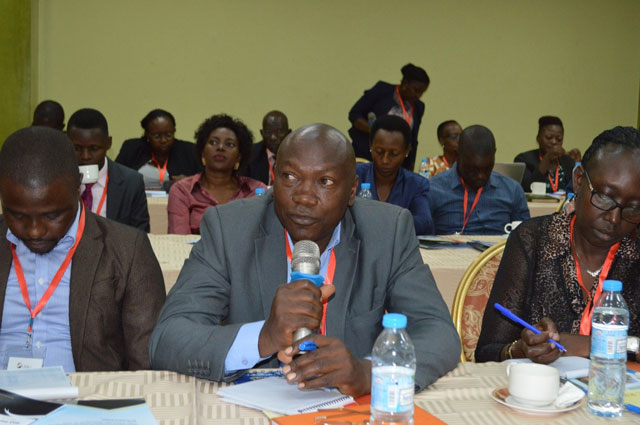
Kampala, Uganda | THE INDEPENDENT | Since its establishment in 2011, the Uganda Retirement Benefits Regulatory Authority (URBRA) has overseen the growth of the retirement benefits sector which, as at end of 2019, contributed 10.3% of Uganda’s Gross Domestic Product (GDP). The sector remains vibrant with an average annual growth rate of 20% since 2014. URBRA’s CEO, Martin A. Nsubuga outlines the trends and prospects of the sector.
Q: You have been at the helm of regulating the retirement benefits sector in Uganda for a while. In your opinion, how is the sector performing?
I am satisfied with the progress we have so far registered in the Retirement Benefits Sector. When we started the journey of reforming the sector in 2003, some of the things we looked at were to have a regulator in place, open up the sector to other players, and also reform the Public Service Pension Scheme to overcome its fiscal constraints.
We are moving in the right direction. Government has delivered on the establishment of the Regulator through the URBRA Act, and amendments to the Public Service Pension Scheme are underway- the Bill is already prepared.
As a regulator, we have since set up a structure and enhanced our capabilities to supervise the sector. We have also seen a number of players joining this market. To date, we have 67 licensed schemes, including the NSSF and 11 umbrella schemes that house 148 participating employers. The sector has continued to gain public trust given the protection of benefits that is continuously assured by the Regulator. The sector has also seen assets under management tripling from Shs.5trillion in 2014 to Shs.15trillion by the end of 2019. NSSF, the biggest scheme in the country, accounts for Shs.13trillion while others, mostly occupational schemes, account for Shs2trillion. This trend has placed the Retirement Benefits Sector among the fastest-growing sectors in the economy, growing at an average of 20% per annum since 2014.
Q: What is the sector’s contribution to national GDP and the development of Uganda’s economy?
Currently retirement benefits savings account for 10.3% of GDP, from 7% recorded in 2014. This excellent growth since 2014 is likely to be sustained as the number of contributing members and the funds value grows as a result of increasing annual contributions. Added to this is prudent investment headed by professional fund managers licenced by URBRA.
As a regulator, URBRA’s primary responsibility is to protect retirement benefits through our supervisory oversight and to continuously provide assurance of the safety of members and beneficiaries’ savings. Saving for retirement is mostly long-term. You start today and get your money after ten to thirty years. Therefore, continuously building trust is paramount. While executing this function, we contribute to our economy by providing a solid foundation for long-term savings to support long-term investments. We currently provide the largest amount of domestic long-term savings that can be leveraged upon to develop the country.

Q: It has been said and widely discussed in the public arena, that the impending amendments to the NSSF Act will trim your power and control over entities you regulate. Does this worry you?
The NSSF Amendments bill has stirred mixed reactions, but let me clarify that NSSF is a regulated scheme, licensed and supervised by URBRA under the URBRA Act. That status shall continue and is not affected by the amendments to the NSSF Act.
While the Bill is well intentioned, we provided guidance as the sector Regulator to the Parliamentary Joint committee of Finance, and Gender and Social Protection. We have no doubt that our guidance will be incorporated in the final Bill.
Q: Over time, there have been complaints about corporate governance in retirement benefits schemes. What are you doing to address this?
One of the biggest challenges we are dealing with is having trustees who are given substantial responsibility under the Retirement Benefits Regulatory Act yet they do not appreciate their fiduciary responsibilities.
Some of the trustees we have in the industry do not understand the key tenets of good governance such as: the basic principles for saving for retirement, basic corporate governance principles, financial reporting and interpretation of accounts, procedures for outsourcing service providers.
Having identified that constraint, we started a Trustees Certification Programme. This is a skills training program meant to boost trustees’ knowledge and skills required to execute their fiduciary responsibilities. We have partnered with the Insurance Training College (ITC), and we think by the end of the year, we would have launched our maiden programme. This will be an examination based five-day training program where we shall test proficiency, to see if they have understood the principal of governance and fiduciary responsibilities. We shall continue with our bi-annual half-day programs to discuss any new development in the sector, and disseminate or clarify on new regulations or guidelines issued.
Q: What are the key challenges the sector is grappling with and what sector level solutions have you devised to address the challenges?
Our biggest challenge so far, is working with a small resource envelope. Since we were established seven years ago, we have continuously received only Shs6bn from the government. This has been supplemented by collections from levies and licences fees, which have increased over the years. Notwithstanding, these levies are reviewed regularly lest we constrain the schemes.
That said, there are a number of things we need to do to match the high growth rate of the sector. We need a robust supervisory system to monitor operations of all the regulated entities in real time.
We also need to expand coverage to the informal sector. We are working on a platform where the informal sector workers can make personal contributions towards saving for retirement. However, due to a small resource envelope, this has been hard to implement, especially because of the legal constraints of establishing a unique system which speaks to differences in the informal sector.
The other challenge is to do with trustees’ competences, and we have attempted to address that through the establishment of a trustee’s certification programme. Lastly, people still have challenges appreciating the basic principles of saving for retirement. Many registered scheme members and the working public do not know their rights, benefits and privileges of saving for retirement. We therefore need to do a lot more to enhance our awareness programme.
Q: During COVID, there was an outcry from savers for you to give them access to their savings to salvage their financial health. Why did you object to this?
First, we do not have powers to grant this access. While we sympathise with members of retirement benefits schemes, we are constrained to support such demands. It is not supported by law neither do we have leeway to violate any provision of the URBRA Act.
Secondly, The NSSF Act, like the Trust Deeds and Rules of most licensed schemes, clearly describes the benefits a person can access i.e. age benefits, withdrawal benefit, invalidity benefit, emigration grant and survivor’s benefit. Both the URBRA Act and the NSSF Act did not envisage circumstances such as Covid-19. These funds are currently for a specific purpose, which is provided for in the laws.
Finally, as a regulator, we ensure compliance of the rules of the game. We nonetheless provided guidance on this matter which has largely been appreciated. This is reflected in the current debates on the subject in the public media, social platforms and Parliament of Uganda.
Q: Where do you see the pensions sector a decade from now?
We envisage increased trust and confidence in the sector as we continue to provide protection of retirement benefits supported by a robust supervisory system. As a result, we project a substantial increase in the assets under management, which is likely to more than triple if the current rates are sustained. We also envisage enhanced levels of trustees’ competences – appreciating their fiduciary responsibilities, as well more membership numbers in the informal sector. We are also likely to see a fully grown efficient and regulated Public Service Pension fund with substantial resources to ably meet the pensions of many retiring public servants.
Q: Lastly, what is your parting word, especially to those you regulate?
We have come a long way with the pension reforms in this country and we are proud of the progress and direction the reforms are taking. We would have loved to move faster, however, irrespective of the constraints, we have been able to provide that assurance to the sector. I wish to reiterate URBRA’s commitment to protect retirement benefits of regulated scheme members and their beneficiaries. That is our primary objective and we shall continue to professionally pursue it by upholding our core values of; proficiency, integrity, innovation, transparency and accountability.
We commit to deliver and take the sector to greater heights.
******
SOURCE: The Pensioners Journal
 The Independent Uganda: You get the Truth we Pay the Price
The Independent Uganda: You get the Truth we Pay the Price


